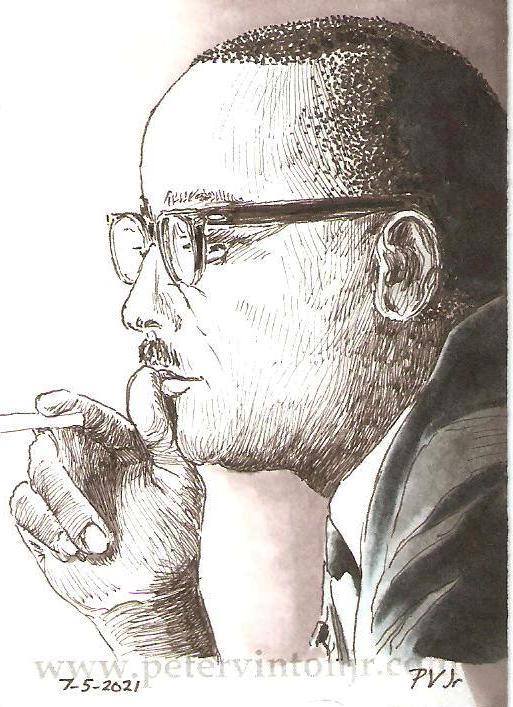
An ongoing illustrative history study
This piece originally posted 7/23/2021
Prelude | 95 | 96 | 97 | 98 | 99 | 100 | 101 | 102 | 103 | Email |
|---|
"The real issue is this: all over the world, people are involved in social revolution. People are coming out from under colonialism --in the case of United States, from under segregation. People are coming out from under the kind of oligarchy governments that characterize Latin America. Now these people --and I happen to think they have just grievances against their governments-- are rising up, taking certain steps. Every time this occurs, the United States manages to get on the side of the oppressive government."
America's first-ever Black television journalist, Louis Emanuel Lomax, was born in 1922 Georgia. His fascination with journalism manifested early; he was the editor of the student newspaper at Paine College in Augusta, from which he graduated in 1942. He received his M.A. from American University in 1944, and then a Ph.D from Yale in 1949. For a time he worked as a reporter for the Baltimore Afro-American and the Chicago American.
In 1958 he joined WNTA, a New York-based PBS station, thereby becoming the first African-American television journalist. A year later he collaborated with his colleague Mike Wallace to produce a five-part documentary about the Nation of Islam: "The Hate That Hate Produced." For many white Americans this was their first exposure to the movement --significantly its leaders, Elijah Muhammad and Malcolm X (the latter of whom consented to an interview by Lomax for the documentary).
By 1964 Lomax had his own interview-format program: The Louis E. Lomax Show, which ran on KTTV in Los Angeles from 1964 to 1968. The show featured topical guests and addressed controversial subjects like the Black Panthers, women's liberation, the war in Vietnam, and the Black Power movement. He once predicted on his show in 1966 that the election of a Black president might be easily done "within the next fifteen to twenty years." Predictably his high profile drew the attention of the FBI, ever alert for the scent of journalists who might be involved in "un-American activities."
Lomax authored a number of books, to include the controversial The Negro Revolt (1962), When the Word Is Given: A Report on Elijah Muhammad and Malcolm X and Black Muslim World (1963), and To Kill A Black Man (1968). Lomax was killed in a car accident in New Mexico on January 30, 1970, while working on a 3-volume history of Black Americans.
Transcript of a 1967 radio interview with Studs Terkel on the revelation of U.S. involvement in Thailand:
https://studsterkel.wfmt.com/programs/louis-lomax-discusses-book-thailand-war-war-will-be
Next page - Lesson 100: Bernard Lafayette, Jr.